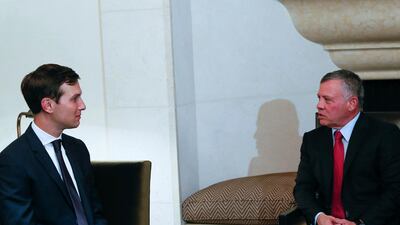Jared Kushner's first solo trip to the Middle East ended with no clear progress in the US pursuit of Israeli-Palestinian peace, although the widening gap between the two parties could be overcome by an intensified push for regional support, according to a former Washington intermediary.
Mr Kushner and his delegation concluded their four-day trip in Ramallah on Thursday by meeting Palestinian president Mahmoud Abbas and his negotiating team. Prior to that, Mr Kushner and Dina Powell, US deputy national security adviser, Jason Greenblatt, the coordinator for the peace process, and Tim Lenderking, deputy assistant secretary of state for Arabian Gulf affairs, held talks with Israeli, Egyptian, Saudi, Emirati, Jordanian and Qatari leaders.
"They want to garner Arab political and financial support for the Palestinians," Husam Zomlot, the Palestinian ambassador to Washington, told The National ahead of the trip. Mr Zomlot had hoped the US delegation would "publicly endorse a vision for a solution" during the trip, but the former US envoy to the peace process, Dennis Ross, had a more gloomy outlook.
“The gaps, the level of distrust, and the political realities of both [Israeli PM Benjamin] Netanyahu and Mr Abbas make it nearly impossible for them to do anything without an Arab cover," said Mr Ross, a distinguished fellow at the Washington Institute for Near East Policy.
"Mr Abbas can only move in a context where Arab states are creating an explanation for him taking steps," said Mr Ross, who served under presidents George Bush Sr, Bill Clinton and Barack Obama. The US delegation's stops in the Gulf, Amman and Cairo before Israel and the West Bank "reflect an understanding that the circle of peacemaking has to be broadened and include the Arab states", he told The National.
While Mr Zomlot viewed the Arab Peace Initiative launched in 2002 that offers normalisation of ties with Israel in return for its withdrawal to pre-1967 borders as a framework for regional peace efforts, Mr Ross hinted at another angle to seduce Arab partners: Iran.
“If the Trump administration can show how it will counter or contain the Iranians in very practical terms,” he said, that “can be used to draw the Arabs into a more active role in peacemaking”.
He noted that Arab countries would still require “a move from the Israelis toward the Palestinians that they could point to as a way of justifying any outreach to Israel.”
Beyond greeting photographers with a grin, even when standing next to Egyptian president Abdel Fattah El Sisi hours after the US withheld $290 million in aid to Cairo, Mr Kushner offered no indications of possible progress during his trip. Mr Ross anticipated that now “the administration will need to decide its next step — parallel moves or statements worked out with each of the parties, resuming negotiations with some agreed basis, some broad agreement on shared principles, or some combination of all these elements”.
He cautioned that “simply resuming negotiations without no understandings will produce nothing but talks that go nowhere. Given the level of disbelief and cynicism, that is the last thing that is needed.”
Key steps in such direction could include “Israel making it clear it will no longer build outside the settlement blocs as a way of demonstrating a commitment to two states; the Palestinians ending preferential payments to the families of those who commit terror or violence against Israelis — to show terror is not being legitimised against Israel”. From the Arab side, some sort of public outreach to Israel, to show a threshold is being crossed, could be expected, Mr Ross said.
Asked if the administration should present its vision for peace based on the two-state solution, something that the US President has refrained from doing so far, Mr Ross “they do have to lay out there support for two states as an end objective and can say it is clear there is no other outcome that could be agreed to by the parties".
“That can show they did not change what President Trump said — simply took account of what the parties could agree to.”
He cautioned, however, that any vision needs to be part of the administration's strategy, not a substitute for it.
Mr Kushner and his delegation were expected to return to Washington on Friday.


